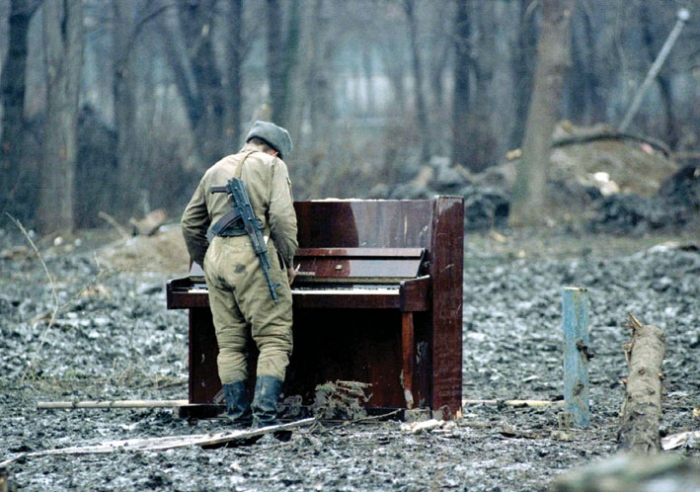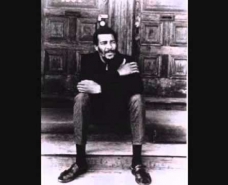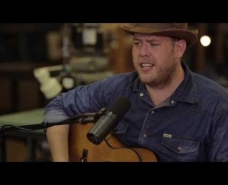How Music Shields a Child’s Psyche in a Time of War

By Sandy Tolan
A few Palestinian children protect themselves from trauma and stress by playing the violin and other instruments.
RAMALLAH—The white van, carrying young musicians riding home from a concert in Bethlehem, suddenly came upon a military barrier erected hastily in the road. “halt!” commanded a sign in Arabic and Hebrew. Just beyond, an olive-clad soldier was checking documents.
”Flying checkpoint,” said Rasha Shalalda, 14, a Palestinian flutist, to her sister Alá, 10, and other fellow musicians. They were students at a Palestinian music school, Al Kamandjati (Arabic for The Violinist).
Flying checkpoints are temporary barriers the Israeli military erects for the stated purpose of catching suspected militants, and those without proper documents, who might try to evade the fixed checkpoints. Also known as random or “surprise” checkpoints, they are among the more than 600 roadblocks, earthen barriers and other obstacles the Israeli military has erected in the West Bank, a land about half the size of Connecticut.
Encounters at checkpoints could be deadly, but mostly, for Alá and Rasha, they were humiliating—dehumanizing reminders of who had control. The “surprise” checkpoints were so ubiquitous that the sisters were never surprised to encounter them. “It’s normal,” Alá said.
The van slowed and came to a stop. The sisters gazed at the sign. Behind the soldier a military Humvee blocked the road. The soldier beckoned the van forward. He opened the sliding door.
“What’s that?” the soldier asked Alá, pointing to her soft blue instrument case.
“This is a violin,” replied Alá.
The soldier told her to step out of the van.
“Do you know how to play?” he asked.
“Yes.”
“Play,” instructed the soldier.
“Don’t play for him!” Rasha yelled in Arabic.
“Play,” repeated the soldier.
Alá frowned, looking into the van uncertainly.
Muntasser Jebrini, a teenaged clarinet player, said softly, “It’s okay. Play, habibti.” Play, my dear.
Standing erect, Alá calmly removed her violin, placed it under her chin, and began to play. She chose “El Helwadi,” or “The Beautiful Girl.” A haunting melody floated from Alá’s little violin—an “Oriental” sound, as it was called in Israel and the West. Certain and strong, Alá’s notes cut through the low rumble of idling cars and floated above the flying checkpoint, into the night air.
In the melody, the sisters could recall the words, about a penniless child whose mood is serene, for she has put her life in God’s hands. With patience, change will come; all will be better.
“We saw in his eyes, he was shocked,” Alá remembered. “It was something he didn’t understand.”
Rasha, staring intently from inside the van, felt a surge of pride in her little sister, playing unfazed. “They claim that we are people with no identity, but Alá proved them wrong,” she said. Music, Rasha believed, was not only a source of pride; it was a means of assertion and protection.
The central purpose of Al Kamandjati, according to its founder, French-trained Palestinian violist Ramzi Aburedwan, is “to protect these children from these soldiers.”
To some the statement may sound like a slogan or a sound bite, or, more bluntly, absurd. Yet in studies on music and trauma from other conflict zones, including Bosnia, South Africa, and Northern Ireland, researchers found that music reduced the recurrence of traumatic memories, raised the threshold for anxiety, and, perhaps more important, created the possibility to “re-imagine” one’s own life. Playing music, the researchers found—making something new in response to the trauma—not only was a way to move beyond victimhood; it was a path to healing and, eventually, to a complete personal transformation.
“Music,” wrote Dr. Michael Swallow, a neurologist, in an essay in Music, Music Therapy and Trauma: International Perspectives, “by raising the threshold for anxiety, [can] reduce the likelihood of resurgence of traumatic memories.”
In Northern Ireland during The Troubles, as the social scientist Marie Smyth wrote in another essay in Music, Music Therapy, and Trauma, creativity was “a resistance to oppression” and a fundamental part of healing. “It is the refusal of victimhood and helplessness. Creating something new is an act of defiance in the face of destruction.”
This was also the case in South Africa, according to Mercédès Pavlicevic, a psychologist and research associate at the School for Oriental and African Studies in London. Music, she wrote, can “tap into the child’s own potential for healing,” and “potentially engage, stimulate and evoke the child’s imagination, offering an opportunity to ‘re-create’ and ‘re-imagine’ life.”
The researchers suggest that the feeling of transformation can be fleeting while the effect of the experience can endure. “Music created through a process of interaction between people can take on a life of its own, and in turn transform those who create it,” wrote Matthew Dixon a music therapist in London, in another of the book’s essays. “The transformation is temporary, but the experience of having been transformed, and the discovery of new possibilities, are more permanent.”
For Alá and Rasha, who were deeply traumatized by Israeli military incursions during the second Palestinian intifada, music became a kind of armor, which they believed protected them.
For Rasha, music became a necessity, and with it came the ability to face difficulties that had only recently been overwhelming. When she became angry or anxious, she would play; her tensions would empty into her instrument and dissolve. It was as if by holding her flute, she no longer had anything to fear. All her troubles suddenly seemed manageable. When she played, her entire focus was on her flute, and on the world she and her instrument made.
“I felt like I was in a forest, all by myself in a little cottage, with no people, no noise, nothing,” she told me. “Mountains, sea, something pure blue, not like the Dead Sea. It was an escape to another world. A better world. I owned that world.”
Al Kamandjati teachers also talk about the transformation of the Palestinian children they encountered, especially the children in the refugee camps “who have been visited in the night by soldiers banging on their doors,” recalled the British violinist Alice Howick, a former teacher at the music school. “Or the two kids in Qalandia [refugee camp] who had to stop coming to lessons because the wall was built alongside their house, and now they are on the wrong side of the wall.” Yet the music lessons, Ms. Howick recalled, could be transformative. “Music needs so much energy: mental energy, physical energy, emotional energy. It forces them to fully engage, with the music, with each other, with themselves.” In the immediate present, she said, it can momentarily transport a child with a hard life, “giving them something else to think about for however long they play their instrument.” More important, she said, “If you can get that kind of engagement and get them to really focus on something, I think it can change their whole concept of the world around them.”
There are limits, of course, to the extent that music can heal children in a war zone. “You don't exchange music for the presence of human rights, for just sitting quietly under your olive trees and have no one bother you,” said Benjamin Payen, a French violinist and former Al Kamandjati teacher. “You can't learn music when you have this situation in your head. Almost all of the families have had someone die. All of the families have someone in jail.” But like Ms. Howick, Mr. Payen has seen music make a profound difference, by providing things children rarely experienced in the camp: “You need a silence, you need a space, you need a breath,” he said.
For Rasha Shalalda, even Israel’s military occupation seemed diminished. “The conditions that we live in under the occupation affect our personalities. For instance, every time we turn on the TV, we see disturbing images and we hear news from Gaza, West Bank, Ramallah, and Hebron. This changed. Everything changed. Everything.”
At the flying checkpoint, as Rasha watched with pride while her little sister played “The Beautiful Girl,” the moment suddenly turned.
Another soldier walked over to listen. He was smiling and seemed to be enjoying the impromptu concert. “I play, too,” he said when Alá finished. “May I try?” Another soldier asked Amir, the guitar student, if he could borrow his instrument.
The soldiers began to play, smiling at Alá and her fellow musicians, who gaped at them in astonishment.
Suddenly, to Rasha, the soldiers seemed like normal people. “I do not know how they can do something like this, but at the same time treat people so badly,” she said, genuinely confused. “I don’t know if they have two personalities, or exactly how it works.”
Soon the van was on its way back to Al Kamandjati in Ramallah, leaving its passengers to wonder who those soldiers were, and what it might be like to meet them under different circumstances.
This article was adapted from Tolan’s book Children of the Stone: The Power of Music in a Hard Land, to be published on Tuesday by Bloomsbury USA.
Source: The Daily Beast
Photo: A Russian soldier tinkles on a piano left behind in a central Gozny Park (1995) - Reuters
Countering Military Recruitment

WRI's new booklet, Countering Military Recruitment: Learning the lessons of counter-recruitment campaigns internationally, is out now. The booklet includes examples of campaigning against youth militarisation across different countries with the contribution of grassroot activists.
You can order a paperback version here.







